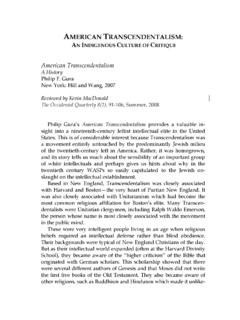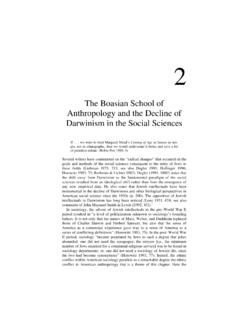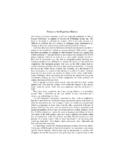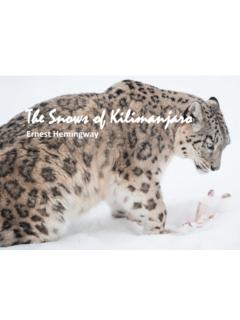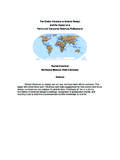Transcription of Jewish Involvement in Shaping U.S. Immigration Policy
1 7 Jewish Involvement in Shaping Immigration Policy Today, .. the immigrants above all the Jewish immigrants seem more American than [the WASP] does. They are the faces and voices and inflec-tions of thought that seem most familiar to us, literally second nature. [The WASP] is the odd ball, the stranger, the fossil. We glance at him, a bit star-tled and say to ourselves, Where did he go? We remember him: pale, poised, neatly dressed, briskly sure of himself. And we see him as an out-sider, an outlander, a reasonably noble breed in the act of vanishing.. He has stopped being representative, and we didn t notice it until this minute. Not so emphatically, anyway. What has happened since World War II is that the American sensibility has become part Jewish , perhaps as much Jewish as it is anything else.. The literate American mind has come in some measure to think Jewishly.
2 It has been taught to, and it was ready to. After the entertainers and novelists came the Jewish critics, politicians, theologians. Critics and politicians and theologians are by profession molders; they form ways of seeing. (Walter Kerr 1968, D1, D3) Immigration Policy is a paradigmatic example of conflicts of interest between ethnic groups because Immigration Policy determines the future demographic composition of the nation. Ethnic groups unable to influence Immigration Policy in their own interests will eventually be displaced by groups able to accomplish this goal. Immigration Policy is thus of fundamental interest to an evolutionist. This chapter discusses ethnic conflict between Jews and gentiles in the area of Immigration Policy . Immigration Policy is, however, only one aspect of conflicts of interest between Jews and gentiles in the United States.
3 The skirmishes between Jews and the gentile power structure beginning in the late nineteenth century always had strong overtones of anti-Semitism. These battles involved issues of Jewish upward mobility, quotas on Jewish represen-tation in elite schools beginning in the nineteenth century and peaking in the The culture of Critique 244 1920s and 1930s, the anti-communist crusades in the post World War II era, as well as the very powerful concern with the cultural influences of the major media extending from Henry Ford s writings in the 1920s to the Hollywood inquisitions of the McCarthy era and into the contemporary era (SAID, Ch. 2). That anti-Semitism was involved in these issues can be seen from the fact that historians of Judaism ( , Sachar 1992, 620ff) feel compelled to include accounts of these events as important to the history of Jews in the United States, by the anti-Semitic pronouncements of many of the gentile participants, and by the self-conscious understanding of Jewish participants and observers.
4 The Jewish Involvement in influencing Immigration Policy in the United States is especially noteworthy as an aspect of ethnic conflict. Jewish in-volvement in influencing Immigration Policy has had certain unique qualities that have distinguished Jewish interests from the interests of other groups favoring liberal Immigration policies. Throughout much of the period from 1881 to 1965, one Jewish interest in liberal Immigration policies stemmed from a desire to provide a sanctuary for Jews fleeing from anti-Semitic perse-cutions in Europe and elsewhere. Anti-Semitic persecutions have been a recurrent phenomenon in the modern world beginning with the Russian pogroms of 1881 and continuing into the post World War II era in the Soviet Union and Eastern Europe.
5 As a result, liberal Immigration has been a Jewish interest because survival often dictated that Jews seek refuge in other lands (Cohen 1972, 341). For a similar reason, Jews have consistently advocated an internationalist foreign Policy because an internationally-minded America was likely to be more sensitive to the problems of foreign Jewries (p. 342). There is also evidence that Jews, much more than any other European-derived ethnic group in the United States, have viewed liberal Immigration policies as a mechanism of ensuring that the United States would be a plural-istic rather than a unitary, homogeneous society ( , Cohen 1972). Pluralism serves both internal (within-group) and external (between-group) Jewish interests. Pluralism serves internal Jewish interests because it legitimates the internal Jewish interest in rationalizing and openly advocating an interest in overt rather than semi-cryptic Jewish group commitment and nonassimilation, what Howard Sachar (1992, 427) terms its function in legitimizing the preservation of a minority culture in the midst of a majority s host society.
6 Both Neusner (1993) and Ellman (1987) suggest that the increased sense of ethnic consciousness seen in Jewish circles recently has been influenced by this general movement within American society toward the legitimization of cultural pluralism and minority group ethnocentrism. This trend toward overt rather than the semi-cryptic forms that have characterized Judaism in twenti-eth-century Western societies is viewed by many as critical to the continuity of Judaism ( , Abrams 1997; Dershowitz 1997; see SAID, Ch. 8). Reform Judaism, the least overt form of contemporay Judaism, is becoming steadily more traditional, including a greater emphasis on religious rituals and a deep concern to prevent intermarriage. A recent conference of Reform rabbis emphasized that the upsurge in traditionalism is partly the result of the increas- Jewish Involvement in Immigration Policy 245 ing legitimacy of ethnic consciousness in general (Los Angeles Times, June 20, 1998, A26).
7 Ethnic and religious pluralism also serves external Jewish interests because Jews become just one of many ethnic groups. This results in the diffusion of political and cultural influence among the various ethnic and religious groups, and it becomes difficult or impossible to develop unified, cohesive groups of gentiles united in their opposition to Judaism. Historically, major anti-Semitic movements have tended to erupt in societies that have been, apart from the Jews, religiously or ethnically homogeneous (see SAID). Conversely, one reason for the relative lack of anti-Semitism in the United States compared to Europe was that Jews did not stand out as a solitary group of [religious] non-conformists (Higham 1984, 156). Although ethnic and cultural pluralism are certainly not guaranteed to satisfy Jewish interests (see Ch.)
8 8), it is nonethe-less the case that ethnically and religiously pluralistic societies have been perceived by Jews as more likely to satisfy Jewish interests than are societies characterized by ethnic and religious homogeneity among gentiles. Indeed, at a basic level, the motivation for all the Jewish political and intel-lectual activity reviewed throughout this volume is intimately linked to fears of anti-Semitism. Svonkin (1997, 8ff) shows that a sense of uneasiness and insecurity pervaded American Jewry in the wake of World War II even in the face of evidence that anti-Semitism had declined to the point that it had become a marginal phenomenon. As a direct result, The primary objective of the Jewish intergroup relations agencies [ , the AJCommittee, the AJCon-gress, and the ADL] after 1945 was.
9 To prevent the emergence of an anti-Semitic reactionary mass movement in the United States (Svonkin 1997, 8). Writing in the 1970s, Isaacs (1974, 14ff) describes the pervasive insecurity of American Jews and their hypersensitivity to anything that might be deemed anti-Semitic. Interviewing noted public men on the subject of anti-Semitism in the early 1970s, Isaacs asked, Do you think it could happen here? Never was it necessary to define it. In almost every case, the reply was approxi-mately the same: If you know history at all, you have to presume not that it could happen, but that it probably will, or It s not a matter of if; it s a matter of when (p. 15). Isaacs, correctly in my view, attributes the intensity of Jewish Involvement in politics to this fear of anti-Semitism.
10 Jewish activism on Immigration is merely one strand of a multipronged movement directed at preventing the development of a mass movement of anti-Semitism in Western societies. Other aspects of this program are briefly reviewed below. Explicit statements linking Immigration Policy to a Jewish interest in cul-tural pluralism can be found among prominent Jewish social scientists and political activists. In his review of Horace Kallen s (1956) Cultural Pluralism and the American Idea appearing in Congress Weekly (published by the AJCongress), Joseph L. Blau (1958, 15) noted that Kallen s view is needed to serve the cause of minority groups and minority cultures in this nation without a permanent majority the implication being that Kallen s ideology of multiculturalism opposes the interests of any ethnic group in dominating the The culture of Critique 246 United States.
